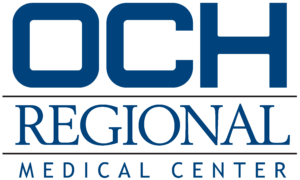Yards of fabric in various colors and patterns, elastic, her trusty sewing machine and some thread from her late grandmother’s sewing basket have all been essential supplies in Emily Marett’s fight against COVID-19. While she’s not on the frontlines caring for COVID-19 patients, her efforts, along with many others, are protecting thousands in her community from spreading the disease.
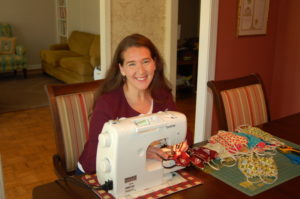
Marett, a faculty member at MSU’s College of Business and a co-leader of Girl Scout Troop 20320, was scrolling through social media in mid-March when she saw a Facebook post about a healthcare system in Indiana calling for the public to sew cloth masks.
“I teach courses on human resource management that cover OSHA and basic safety practices. I know that homemade masks are insufficient personal protective equipment (PPE) for nurses and doctors facing a highly contagious disease, but that showed me how serious the supply chain issues really were, and I thought, this is a way I can help,” said Marett.
A little encouragement from her friend, Emily Brown, a nurse at OCH, and excitement from her local Girl Scout Troop about the service project motivated Marett to contact OCH about the need for cloth masks. Unbeknownst to Marett, Holly Fron, had also reached out to the hospital the same day about sewing cloth masks.
“I had my babies at OCH, and I just so loved those nurses and the sweet ladies who came in to clean my room. Knowing that there was a global shortage of PPE and they might not have that first line of protection broke my heart. I just wanted to do what I could to help,” said Fron.
Fron, who has been sewing since age eight and Marett, a 12-year veteran sewer, teamed up and within four hours the
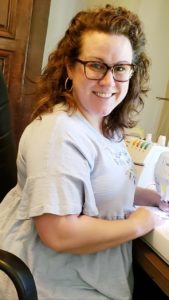
long-time seamstresses had a mask prototype for OCH to approve. The next afternoon, they had the pattern written with photos to illustrate each step.
“Emily wrote out the directions, and I proofed them and tested them for accuracy,” explained Fron, all while quarantining at home with two young sons.
During this process, Marett said, “I started to see more and more people posting on Facebook about sewing masks for OCH. We quickly realized that we weren’t the only ones who were anxious and eager to do something to help our local healthcare heroes, and I knew that we needed a centralized place to coordinate our efforts.”
And from there, the suitably-named website and Facebook group “Starkville Sew Strong” was up and running with a goal of donating 500 masks to OCH. In just two weeks, the group doubled their target number, sewing 1,000 masks.
“We immediately hit it out of the ballpark. I was floored,” said Marett.
As CDC and the State Department of Health’s guidelines changed, so did local policies and ordinances. OCH began requiring everyone entering the hospital to don a mask, and the Starkville Board of Aldermen voted to require masks when visiting businesses and facilities, thus creating the need for more masks.
“Many hands make light work has kind of been our philosophy,” said Fron. “At the beginning of this process, I thought I could make 50 to donate and be done, and that has turned into four or five hundred [masks] at this point. I didn’t realize how great the need in the community would be,” said Fron.
“The most heartwarming part was that even after doubling the initial goal, no one stopped sewing,” said Marett, who has sewn over 400 masks. “Never in my wildest dreams did I think it would grow to what it is today. Everyone has participated so enthusiastically, and it just makes you fill up with love and hope.”
As Starkville Sew Strong continued to grow in numbers, reaching nearly 700 members, so did the number of masks. In two months, the group would extend their efforts to supply masks to clinics, businesses, long-term care facilities, firefighters, the police department, Mississippi State University, and even shoppers in stores who were in need.
MaryEsther Elam is one of the hundreds of members who joined forces with Starkville Sew Strong, but unlike most people in the group, she didn’t sew, except for the time she attempted to make Christmas stockings. Nevertheless, she dusted off the sewing machine in her attic that was handed down from her mom years ago.
“My Aunt Lonnice [Fields] came over to show me how to use the machine, and I bet it took us four hours to make the first
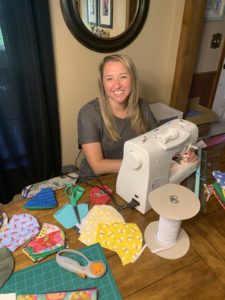
one. We didn’t have a pattern to use at the time, and I thought, I’ll never be able to do this,” said Elam.
After making about 10 masks, Elam found her rhythm: cut, pin, sew, and soon, her dining room was converted into a small makeshift factory; while her aunt decided her services were better used as a courier, picking up hundreds of masks and delivering them where needed.
“Don’t ever say you can’t do something. You can’t until you try,” Elam said.
Elam estimated that she’s sewn around 350 masks and can now make one in about 15 minutes.
This “We can do it!” Rosie the Riveter-mindset is the common thread woven throughout each individual at the sewing machine.
“My grandfathers both served in World War II, and my grandmother Vivian Glabau was very frugal and used her resources wisely,” said Marett. “This whole time I’ve been thinking about her and her experiences and how everyone has banded together. I feel like she would be proud that I was participating and using her sewing materials for a project like this.”
“We’re not building bombs, but it’s what we can do. I have this talent, given by God, and I can help,” said Fron. “Honestly, I sometimes feel like what I’m doing isn’t enough, but then I remember during World War II, people would turn off their lights at a certain time to conserve energy. This is a small way we can show we care about our community.”
Speaking from experience, 86-year-old Nelle Elam, MaryEsther Elam’s grandmother by marriage, said, “Anyone who has lived through those types of experiences, you re-evaluate what is important. My hope is that when this thing is all over that we will have a more gentle and kind world.”
The group has collectively sewn almost 10,000 masks to date, with around 2,800 masks donated to OCH.
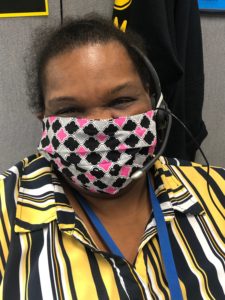
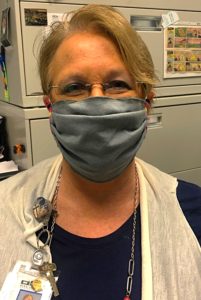
“These cloth masks have allowed us to prioritize essential PPE for the frontline staff caring for COVID patients, while also protecting patients, visitors and our non-clinical employees,” said OCH Quality/Infection Control Director Savannah Brown. “They have told me that they pray over these masks before delivering them to us, and that just really touches my heart. ‘Thank you’ is just simply not enough.”
Members will tell you it’s a “labor of love,” and they have no plans of slowing down as they distribute masks not just locally but also statewide. Threads on the group’s Facebook page reflect the continued collaboration and support of one another with messages asking for thread, fabric, elastic, and announcements such as, “523 masks for the Blair E. Baston’s Children’s Hospital in Jackson in honor of the Jamie Rodgers family for the care and support they gave his son Maximus and all the children they care for.”
“What dedication!” said Nelle Elam, who has also sewn masks. “Sitting at those machines for hours to make masks for others. What an unselfish, kind thing to do.”
While some members are being forced to take a hiatus due to inflammation and sore muscles from countless hours of sewing, the group continues to rally together to meet the requests for more masks as the number of COVID-19 cases increases in their community.
“You can look and find the negative in any situation, but you’re not helping anything by looking at the negative,” said Fron. “It just helps me to see the positive and to serve and think of others during crises. It makes us all better people.”
